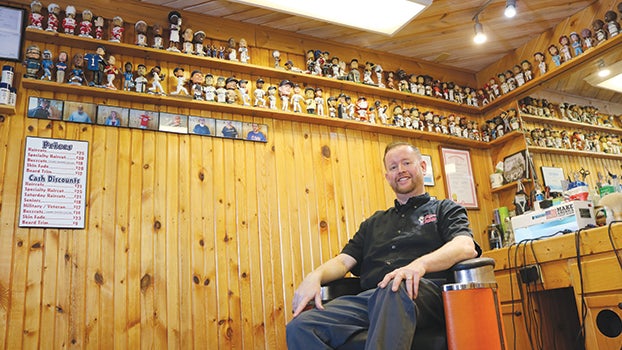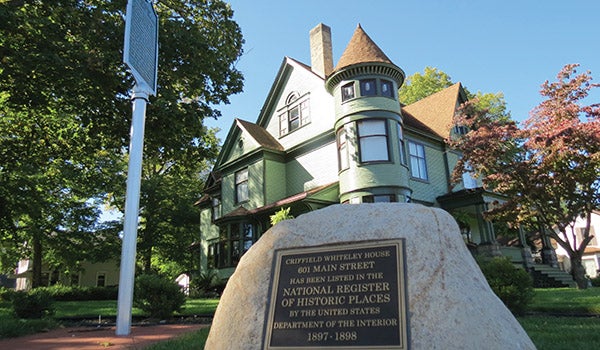Making the grade: Longtime teacher reflects on changes in education
Published 8:57 am Monday, February 29, 2016

Sara Gleason, a longtime Brandywine teacher, practices the “N” sound with a student in her kindergarten class. (Leader photo/CRAIG HAUPERT)
Editor’s note: Find this story and others inside Horizons 2016, available for purchase at any of Leader Publications’ offices in Niles, Dowagiac or Cassopolis.
Sara Gleason teaches developmental kindergarten at Brandywine’s Merritt Elementary School, a place she has called her professional home for more than 30 years. With three decades of experience under her belt, the popular teacher reflects on the evolution of the classroom, the growth of children and the challenges of the education system.
Q: Why did you get into teaching?
Kids just always came natural to me. My folks were teachers, my grandmother was a teacher — it just was one of those family things and seemed right for me.
I was actually considering going into high school teaching, doing speech and theatre at first. My roommates were elementary teachers and I started dealing with that and thought, “I like this better.”
Q: What makes a good teacher?
You have to like kids and you have to respect kids. You have to know what they can and can’t do. You have to be able to look at kids, know what they aren’t getting and try to figure out how they can get it.
The moment when you see that light bulb go on — that is why you do it. To see them suddenly get it. I can’t fathom doing anything else. I really can’t.
Are you having fun teaching?
I am, even after 32 years.
Q: How do you maintain your energy and enthusiasm for teaching after three decades?
I don’t know — the kids just bring it out in me. I like what I do and I just maintain that energy. I like where I am at and I don’t even have caffeine anymore. I still enjoy teaching them and seeing them get enthusiastic for learning.
Q: How has teaching changed since you first started?
These children are not coming into schools with the same backgrounds and information. They don’t have the same skillset. Kids are not going outside and playing anymore, so their physical development is less.
Parents are not shoving their kids out and shutting the door like they did when we were little. They are being protected inside so they aren’t developing their gross motor skills, they aren’t developing their bodies. All of those things we did — rolling around in the grass, riding our bikes, playing basketball — helps with brain development. Their brain isn’t getting that, so already the kids today are behind.
The use of iPads and phones are changing the way kids’ brains are developing and parents have used those kinds of tools as surrogate adults. Kids aren’t getting the same personal dialog and interfacing that they used to. It is child to a computer screen. How is that interacting? It’s not.
They sit and expect to be fed information. They don’t seek the information. They expect to be told what to do — they don’t just try to do it.
Q: Do you think children are receiving a better education now than when you first started?
When I look at 5-year-olds and what they are asked to do in the regular kindergarten classes — it is what you and I were doing in the first grade.
Education has been squashed down and these kids are being forced to do things that they are not developmentally ready to handle. They are being forced to handle it. Kids are not being allowed to take things as they naturally come upon it, unfortunately. We as teachers know that, but we are being told by our politicians now that your children have to do this.
Some of the kids aren’t ready for it. They aren’t cookie cutters. It is frustrating.
Q: What do you enjoy most about teaching?
My favorite thing is watching the kids and waiting for that light-bulb moment.
My favorite thing to do during the course of the day is to read them a story and do language lessons to teach them words, language and what it all means.
A simple story that would take you five minutes to read to your daughter at home takes me 20 to 25 minutes to read to the kids because we are going over the words so we learn what they mean. We talk about the pictures, describe things. That particular element of my day — I love it. I live for being able to read to the kids and take them through every avenue of that story.
Q: What is the most challenging part of your job?
Keeping up with all the paperwork. I do some state assessing and it is a good thing to be able to prove that you are doing your job, but still all that paperwork is very overwhelming.
When you are teaching, you don’t get a break for seven hours — it is non-stop. After you get that done, then you have to sit and do paperwork to show what you have done. I don’t think many other jobs have that kind of accountability that you have to do on your own time. Whereas teaching, you can only prove that on your own time. You can’t sit and work on that during the day.
Q: What is the No. 1 issue facing public education in Michigan today?
It is the accountability part. It just seems like our politicians have worked on making us in the teaching profession the bad guys, that it is our fault that the kids aren’t progressing, when no one is addressing the home issue.
We haven’t touched these kids for five years. They come to us with what their parents — their first teachers — have taught them. Yet, we are accountable if they aren’t up to these standards when nobody is holding the parents accountable for those first five years.
A child learns the most they are ever going to learn in their first five years of life.
Why aren’t the parents being held accountable? We only have them seven hours, so what are they doing the rest of the day? I find that very frustrating.
Q: If there is one thing you could change about education, what would it be?
For me, I still get to do a lot of teaching the way I’ve always taught because I don’t have the same demands. But as I watch my colleagues, I wish they could be able to have fun again teaching. They aren’t having fun because of all the demands and the requirements. I wish that they could get back to having the same amount of fun that they used to be able to have, working with the kids.
Are they doing a great job? Yes, they are. I am not saying that, but it is more drudgery. It is not as much fun for them because, “oh my gosh, we have to prepare for this test. We have to do this, we have to do that.” That, to me, is what is frustrating.
Q: What is the best teaching advice you’ve received?
My first principal, Leo, gave me this advice: Don’t be afraid to admit when you are having trouble and need help. Ask for help.
I have clung onto those words and I am not afraid to ask. Those have been the best words for me.
Q: The best lesson you’ve learned from your students?
The enthusiasm of learning something new and the discovery when you get it. They find such delight in the smallest things.
To see these 5-year-olds get excited by some of the simplest things and the energy they get from that kind of stuff — that is a cool thing to look at and to get from them.
They are happy to learn, happy to discover.
Q: How have you changed as a teacher over the years?
I feel being a mom helped me a lot because I got to see more of what kids were doing and it has given me a lot of patience. I did not have a lot of patience in my first few years. As I’ve gotten older I’ve gotten more patience and more to draw back on.
I can pull back from all my years of experiences and I think it has made me a stronger person and a stronger teacher. I can talk to today’s parents and say, “I’ve done this and this is what you need to do.” They trust that because they know I’ve been around the block a time or two.
Q: Would you advise someone to get into teaching?
I would. Even though teachers are taking a hard hit and there is a lot of people that would say, ‘don’t go into teaching,’ if you have a passion for teaching you need to do it.
It will be tough, but we need good teachers. We are already feeling a shortage in the state of Michigan. The teaching profession is taking a huge hit and in the next few years we are really going to see a big hole, especially in Michigan.
Q: How do you hope your are remembered by your students?
That I cared and loved them and held them very near and dear to my heart. Once you are a student of mine you are always my kid.
I hold that very near and dear to my heart. I truly do. My kids, from my first year of teaching, still call me Ms. Meyer.
I will go to the high school and call a junior or senior by name and it blows their mind that I still remember them and can pull out their name.
I would like to be known by the fact that the kids knew I cared about them.






